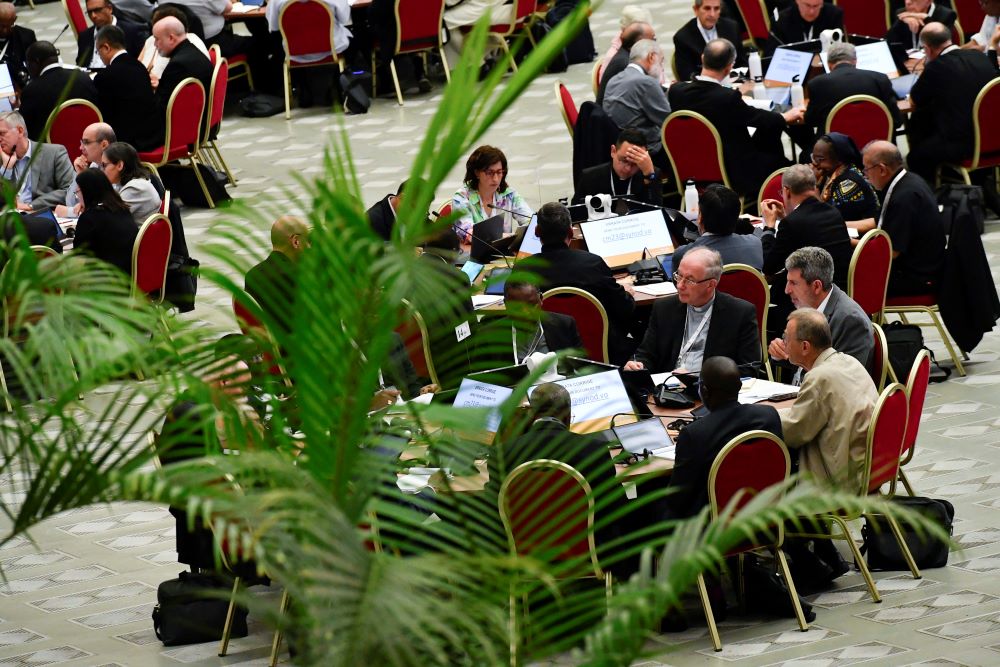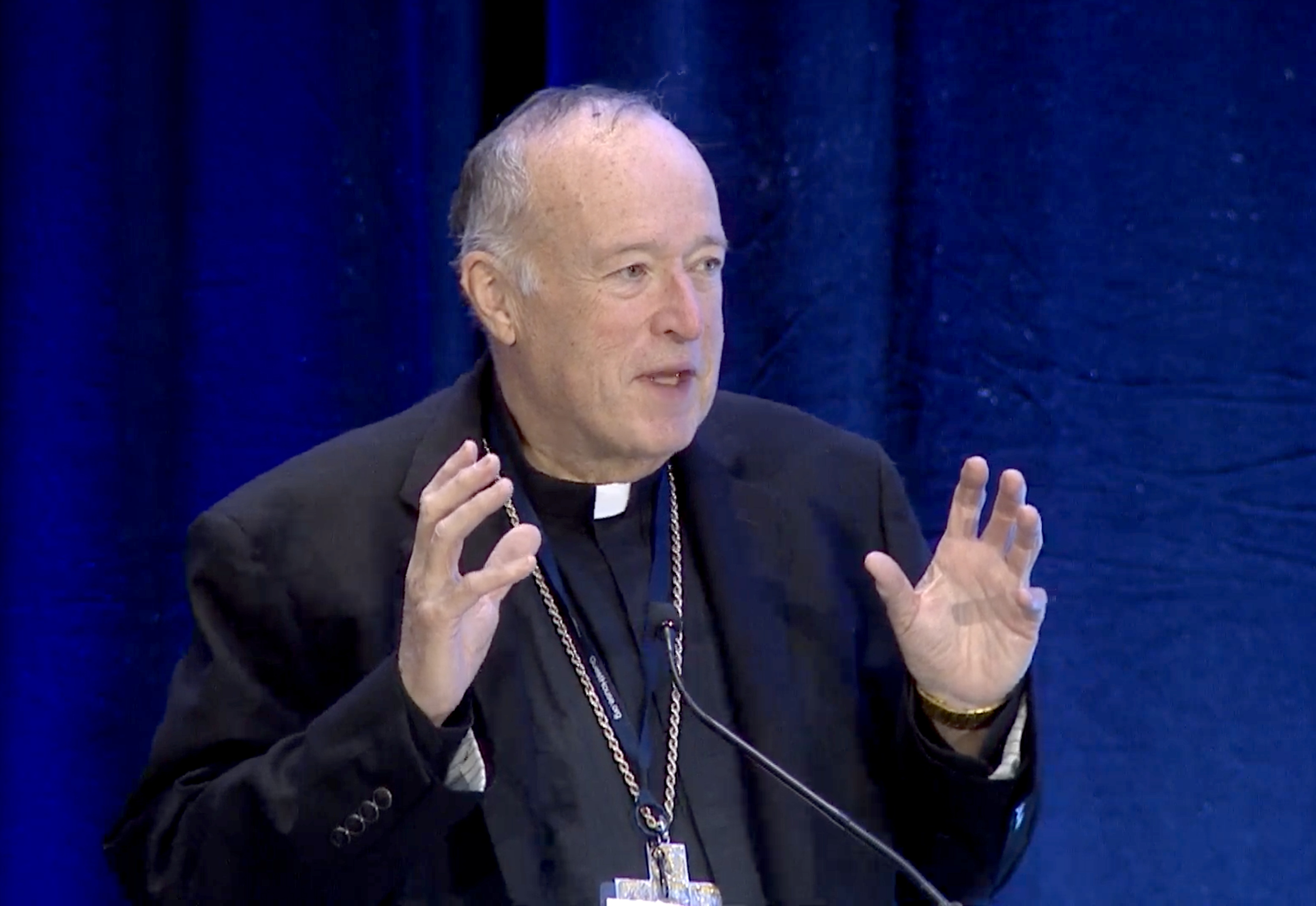From National Catholic Reporter:
Disclosing God's love

Members of the assembly of the Synod of Bishops, organized into 35 groups based on language, begin their small-group discussions Oct. 5. in the Paul VI Audience Hall at the Vatican.The Oct.4-29 assembly concluded with the release of a synthesis statement, which included recommendations. (CNS/Vatican Media)
Editor's note: Following is the transcript of San Diego Cardinal Robert McElroy's address to the Religious Formation Conference on Nov. 10 in Chicago, which is published here with permission.
“It is with great joy that I join with you today. For last month's meeting of the synod in Rome has convinced me with even greater depth that the conversion to a synodal church constitutes the call of the Holy Spirit to the people of God in this epoch of history. And I am ever more convinced, also, that the degree to which religious communities have already enshrined synodality in their life and ministries equips them to become uniquely powerful witnesses to the synodal conversion to which the spirit is leading us.
The very nature of the synodal assembly in Rome testified to the identity of the church as the entire people of God in a piercing manner. Bishops, laywomen and men, religious, priests and deacons all sitting around common tables together in union with the pope, dialoguing in deep faith and insight, and voting equally upon the interim report — that will be the basis for future action. These dimensions of the assembly experience point to the reality that we were truly all journeying together on this pilgrimage on Earth in the name of Jesus Christ. It was a stark contrast with past synods, where bishops alone voted and the bulk of the sessions were spent listening to a seemingly endless series of speeches that left participants passive and disengaged.
The "i" had to become the "we," and the "we" had to seek, at every moment, the grace of the Holy Spirit to ensure that our earthly perspectives, interests, alignments and desires did not cloud the call of the Gospel.
The starting point for the synod was the instrumentum laboris, which reflected the global process of discernment that brought together the experiences, the joys, the sorrows and the hopes that millions of Catholics shared about the faith that animates their lives.
Uniting these testimonies of faith was a deep devotion to the fundamental and enduring mission of the church which it receives from Christ, the one sent by the Father. Guided by the Holy Spirit, the church witnesses to the Gospel in its fullness and thus cooperates with the coming reign of God. It is this mission which is the heart and soul of a synodal church.
The method of dialogue in Rome was conversation in the Spirit, a process of deep discernment which truly opened up the hearts of the synod participants. Beginning with the word of God and prayer, the participants at each table would share their initial reflections on the question at hand, each listening to the other, with substantial pauses between contributions for prayer and reflection. Then, building upon a series of such rounds, each table moved toward more directly addressing the issue for that session.
This method diminished frictions and magnified commonalities, precisely because all came to see with a greater understanding the faith of the other. As you in religious life fully recognize, such a process of discernment allows the grace of God to be recognized more clearly in our midst, and points to the commonality of our identity as disciples of Jesus Christ, bound together in our love for God and the church, even amidst sometimes contentious topics.
The synod was a profound experience of the universality of the church. Because we switched tables five times during the course of the synod, each of us came into contact with the face of the people of God in every continent and across a multitude of cultures. It was fascinating, transformative and powerfully transcendent to witness God's diverse tapestry of grace at work throughout the world.
There were enormous issue areas on which there was broad consensus — the centrality of the kerygma; the missionary identity of the church; the importance of placing the Eucharist at the center of every element of ecclesial life; the need to expand and invigorate ministries open to the laity; the church's imperative to go out of itself to embrace and advocate for the poor, the marginalized, the oppressed and the hopeless; the importance of a paradigm shift in the church's invitation to, and treatment of, women; and the need for a global rather than a national or mono-cultural perspective.

Cardinal Robert McElroy of San Diego speaks Nov. 10 to the Religious Formation Conference's 2023 Congress in Chicago, on how women and men religious can help transform the Catholic Church into a synodal church following the path of the Holy Spirit. (NCR screenshot/Religious Formation Conference)
But there were also areas of deep divide — on how to meaningfully include the laity in the church while maintaining the integrity of its hierarchical nature; on how deeply inculturation and decentralization should proceed in the Catholic community; on questions of the diaconate; and inclusion for LGBT communities.
Yet both the areas of consensus and those of division only served to underscore more deeply that the vision of synodality which Pope Francis has proposed for the church will be critical to guiding the people of God along the pathway to which the Holy Spirit is calling us.
Synodality is not rooted in specific outcomes, no matter how important. It seeks nothing less than a recasting of the culture of the church that will endure for generations. For this reason, the Holy Father has insisted the synodal reflection and action that we are undertaking throughout the world must be thought of as a process of conversion.
A specific architecture of synodality underlies Pope Francis' call to transformation in the life of the church. It is rooted in the methodology of seeing, judging and acting, and it springs from his belief that synodality is vital to "plant dreams, draw forth prophecies and visions, allow hope to flourish, inspire trust, bind up wounds, weave together relationships, awaken a dawn of hope, learn from one another and create a bright resourcefulness that will enlighten minds, warm hearts, give strength to our hands."
It is essential to understand 10 distinguishing marks that characterize Pope Francis' vision of a synodal church, and the manner in which these distinguishing marks shaped the global dialogues which have taken place during the past two years and the dialogues of the assembly in Rome.
1. Synodality points to the reality that the whole of the people of God are journeying together in the life of the church and in synodal action. This means that we cannot operate from a mindset of complacency or one that accentuates the differences among the baptized. Rather, we must view ourselves as the people of Israel were called to do in the desert, united in their faith and in their understanding that God was calling them to an ever new way of life. As we were reminded at the Roman assembly, our individualistic perspectives on issues needed to be replaced by a communal understanding rooted in our common identity as disciples of Jesus Christ. The "i" had to become the "we," and the "we" had to seek, at every moment, the grace of the Holy Spirit to ensure that our earthly perspectives, interests, alignments and desires did not cloud the call of the Gospel.
Discernment, both individual and ecclesial, is not primarily cognitive, but spiritual and intuitive. Our intellect provides critical guidance, but is not the central element in apprehending the mystery and the call of God within our souls and within the soul of the church.
The synthesis of the synodal assembly . ..”

No comments:
Post a Comment